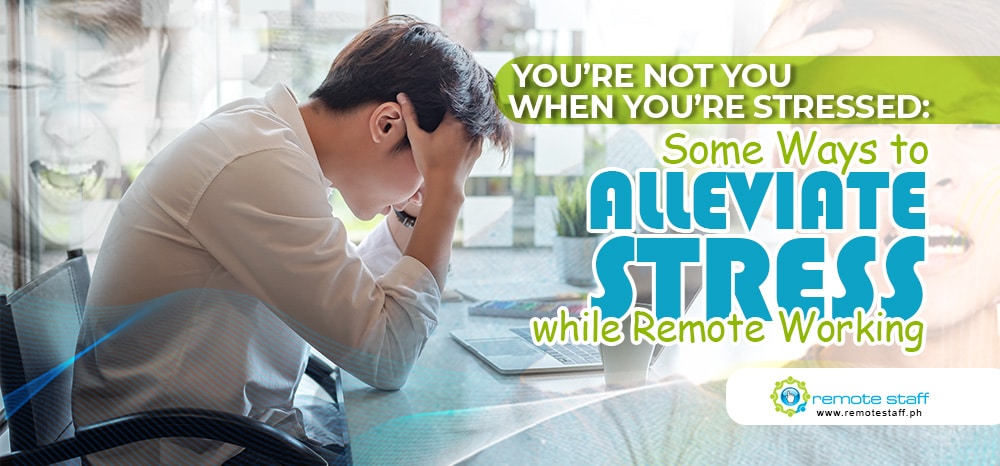Work. Current Events. Your family. The isolation from your friends. That noisy pet your neighbor has across the street. These are just some of the many sources of stress for remote workers during this pandemic. Stress is not something new in our lives. It is our body’s natural response towards pressure and feelings of having little control over a situation.
For many, they’ve become so accustomed to it that being stressed doesn’t faze them anymore. For others, including myself, stress hampers our productivity at work. It also doesn’t help that remote work is unfamiliar territory for Filipinos used to the division between work and home life.
To help you avoid work from home burnout, here are some remote work stress management techniques that can help you at home. Of course, these tips aren’t the only ways for you to handle stress. But they can serve as a starting point for you if you don’t know where to start.

Establish a Proper Workspace at Home
If you’ve been reading my articles, you’re probably getting tired from seeing this advice constantly. But one of the main contributing factors of remote work stress is the sudden fusion of work and home life. There are now plenty of distractions and temptations that can shift your focus away from your work.
By establishing a proper workspace at your home, you can mitigate this issue and re-establish boundaries between work and home. Having one also spares you the stress of constantly being distracted by the various background noise at home. In addition, having easy access to your tools and equipment saves you time looking for them, which further reduces your stress.

Declutter your Workspace Regularly
Connected to my previous point is this one. Having a proper workstation isn’t enough. You must also make sure that you’ll feel comfortable in it as well. One way to do this is to make sure you’re workspace is regularly cleaned. A clean workspace provides an encouraging atmosphere that will help reduce your stress after a day’s work.
Aside from reducing stress by making your workspace more ergonomic and pleasing to the eye, there’s another stress-reducing factor to cleaning your workspace. This factor is the sense of accomplishment and purpose you feel after cleaning your workspace yourself. This feeling helps in motivating yourself in work as well as boosting your self-confidence.

Practice Self-Care
Another remote work stress management technique you should practice is self-care. With all that’s been happening these days, it’s so easy to forget to take care of yourself. Not only will this negatively affect your physical health, but it’ll also cause anxiety and self-esteem issues as well.
One way you can take care of yourself while also reducing your stress is exercising and doing meditations. Doing these also helps keep you fit and healthy, which is crucial now that the pandemic shows no signs of stopping anytime soon. It will also help remove your mind from your work worries, allowing you to relax.
Another thing you can do when practicing self-care is giving yourself rewards after accomplishing your tasks. Rewarding yourself validates your efforts and gives you more motivation to continue working as well. These rewards don’t need to be expensive, so long as you feel happy receiving them.

Breaks Exist for a Reason
Another way you can practice stress management while working from home is by giving yourself a break once in a while. Taking a break from work allows you to destress yourself and regain your strength for further work. It also prevents you from experiencing work from home burnout as well.
The next time you take a break, why not try doing Niksen? Niksen is a dutch concept that translates to “to do nothing or be idle without any use.” This concept is different from simple resting or mindfulness in that you’re doing nothing on purpose. This activity allows you to detach yourself from work so you can fully rest without worrying about your work.

Form a Schedule and Follow it
The sudden lack of structure brought by remote work is another cause of stress for new remote workers. What was once clearly defined schedules are now flexible due to the nature of remote work. Although this has its advantages, it might take some getting used to for some as well. One way to mitigate this is by establishing your own schedule while remote working.
Doing this requires discipline on your part, as you won’t have a supervisor present. At first, you may struggle to keep up with your schedule, but just stick to it. Think of it as sticking to a diet or exercise regime. It’s difficult at first, but the more you stick to it, the easier it gets.

Talk to Friends
From experience, one of the best ways to do stress management while working from home is catching up with friends. Whether through Facebook, Twitter, or even just a text message, knowing you’re not alone goes a long way in keeping you sane.
Your conversations topics don’t have to be anything philosophical or profound. I have found that some of the best conversations I had with my friends during the pandemic began from mundane topics. The important thing is that you’re making up for the lack of physical interaction with your friends by connecting to them online.
Another way you can connect with your friends online is through playing video games together. Not only can you bond with your friends this way, but you can even make new ones as well.

Sleep is Precious
One of the best ways to alleviate stress is getting a good night’s sleep. And one of the main advantages of remote working is that you get to sleep more. Unfortunately, a combination of work stress and the pandemic makes getting sleep difficult. In my experience, these two can keep you up at night, constantly making you worried and anxious about the future.
Fortunately, there are ways you can do to protect your sleep. One of these is meditation. No, this doesn’t require you to mimic a Buddhist monk. Meditation allows you to relax and reflect on what is happening in your life without fear or worry.
Another technique you can do is to avoid using your gadgets just before you sleep. The blue light emanating from these can mess with your body rhythm, interrupting your sleep pattern. If you want to use your gadgets, do so hours before bedtime.

Conclusion
Whew! And we’re finished! These are just some of the remote work stress management techniques you can use to reduce your stress. If you want to learn more, here’s one about how journaling can be beneficial for you. I hope these tips will help you in finding a way to destress yourself while remote working.

